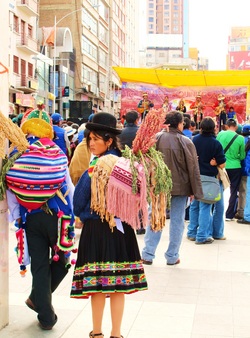I happened upon the Organic Quinua Grower’s Organization feria in La Paz this weekend. I’ve rather enjoyed the taste of quinoa for a while, but I never realized how beautiful it looks while still on the stalk (I think stalk would be the right word…). There’s an autumny dried flower look to it. And as I stood at the back of the crowd during the welcoming speech, it seemed like everyone in front of me was dressed in beautiful traditional clothes with a pack of quinua bundled on their back. I really wanted to take a picture, but felt a little conspicuous. But eventually I noticed a man near the front taking some pictures so I pulled the camera out quickly and snapped 2.
I suppose the real issue here stems not from one human’s objectifying of another, but the grand scale of global inequality produced by centuries of colonialism and imperialism in which there is an imagined bucolic other awaiting the North Atlantic explorer in far off lands. And to capture such a person on film (or digitally) amounts to a form of conquering. Perhaps that’s just me trying to displace responsibility for my own actions. But at the same time, it calls into question whether, even in episodes of performance, it is possible to capture pictures that do not reify, objectify, and in a way erase the inequalities between my life and a luchadoras.
In the end, I was given a flyer about women quinua growers and how women have always been fighting (yes, “luchando”) for their families and financial stability.

 RSS Feed
RSS Feed
